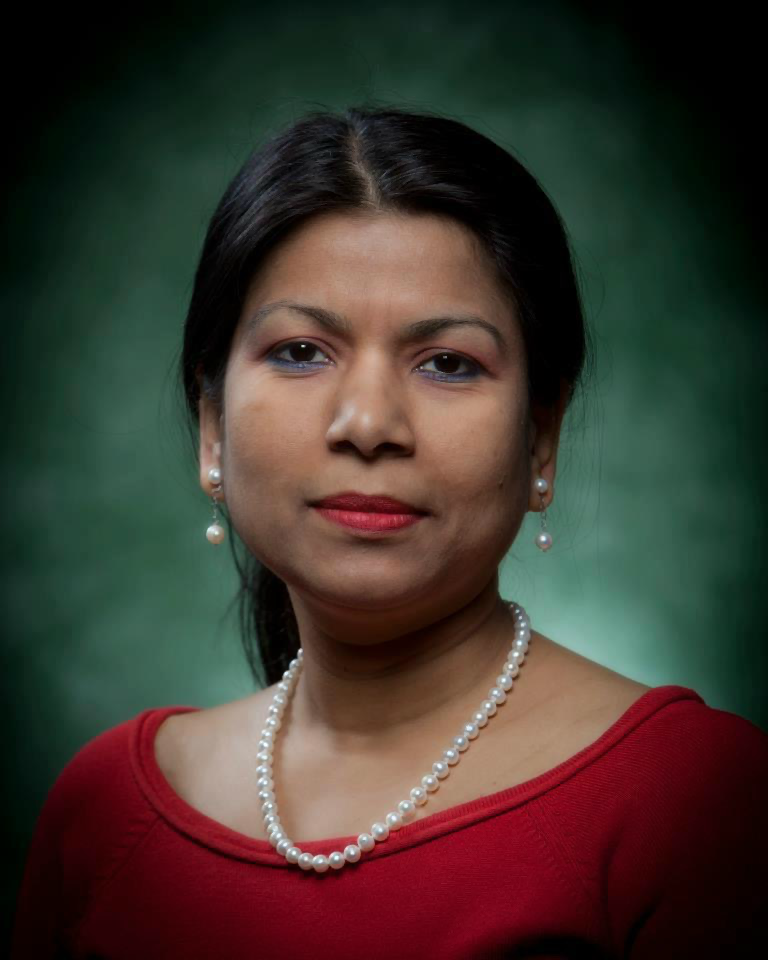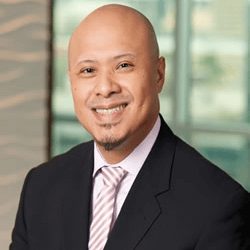
Nasrin Fatima serves as the Associate Provost for Institutional Research, Effectiveness, and Planning at Binghamton University. She plays a key role at the University supervising the Office of Institutional Research and Assessment.
Among her duties, she coordinates all internal and external reporting of official university statistics and data files (including enrollment and tuition revenue projections), conducts research studies and analyses of university data in support of key campus initiatives, decision making and strategic planning, oversees the University’s Operational Data Store, and leads the implementation of an enterprise-wide data warehouse.
Furthemore, she is also involved in overseeing campus-wide student learning outcomes assessment activities, general education learning outcome activities in addition to unit level operational outcomes assessment. Additionally, her job is to make sure that all federal/state accreditation standards for both at institutional and program level are in compliance.
She came to Binghamton University from Pennsylvania College of Technology where she served as the Assistant Vice President for Assessment, Research and Planning.
Prior to Pennsylvania College of Technology, Fatima served as the Director for Institutional Effectiveness and Assessment at Xavier University of Louisiana. Fatima earned a bachelor’s (honors) and a master’s degree in English Literature from University of Dhaka, Bangladesh. She received a master’s and doctoral degree in Higher Education Administration from the University of New Orleans. Her doctoral dissertation earned the Distinguished Dissertation Award.
Fatima’s professional affiliations include the American Educational Research Association (AERA), the Association for Institutional Research (AIR), Association for Institutional Research and Planning Officers (AIRPO), the Association for the Study of Higher Education (ASHE), North East Association for Institutional Research (NEAIR) and Society for College and University Planning (SCUP) and presented extensively at the above mentioned organizations. She also has published and a number of scholarly papers.
For those reasons and as a leadership figure, we have brought Nasrim Fatima today to intelligenthq in an interview carried out by Dr. Emad Rahim.
Question: What is your leadership style and management principles for success?
Answer: What kind of leader am I? Do I follow the style of the classic definition of a leader: someone who aims to influence and motivate employees to meet organizational goals and effectiveness? In this sense, yes I do (by default). But I also believe that I don’t follow a particular leadership style. It depends on context and the people involved, similar to data. Data are valuable but data without context has no meaning or value. I adapt my style based on the particular demands of the situation, the particular requirements of the people involved and the particular challenges facing the organization. It is true that I’m ‘achievement –oriented’. I believe everybody can do better with the right nudge and willingness to do hard work. I believe in autonomy and empowering my team but don’t hesitate to be directive if the situation demands it. I’m very supportive of my team and will help them with all my abilities to overcome their challenges. However, the essential leadership qualities needed for my success include excellent and open communication, collaborative skills, and the ability to do the needs assessment of my team to find their strengths and areas of improvement.
Q: How did you get started in this line of work? How long have you been with your university?
A: I have been with Binghamton University almost six years. But I have been in the higher education field for over fifteen years. I came to this line by accident. I didn’t even know there was a career field called Institutional Research. When I came to the United States for my graduate education, my initial goal was to get a doctoral degree and teach at a higher education institution. However, while I was working as a GA/TA/RA during my graduate education, I learned that I love data and I’m good at it. That’s when my goals shifted to research and data analyses. So I pursued my newly found interest and here I am today!

Q: How have you prepared for your administrative career in higher education?
A: Both my master’s and doctoral degrees in Higher Education Administration from the University of New Orleans (UNO). So pretty much my educational experience at UNO provided me the theoretical foundation and real-world application needed to excel in leadership roles in higher education. Additionally, my work as Graduate Assistant in the Department of Educational Leadership, Counseling, and Foundation at UNO provided me hands-on experiences to prepare for careers as a highly effective higher education administrator and staff professional. After receiving my doctoral degree, I worked as Data/Research Consultant where my work was focused on collecting and analyzing higher education institutional data on affordability and accessibility from OECD countries as well as designing and performing independent qualitative and quantitative research on topics that support and further the mission, vision and strategic planning process of several higher education institutions. After working five years in that capacity, I took a job as the Director of Institutional Effectiveness and Assessment at Xavier University of Louisiana located in New Orleans in 2008. New Orleans was devastated by Hurricane Katrina in 2006 and I wanted to go and give back to New Orleans in any capacity. Xavier University is a unique Historically Black Private University. I learned a lot from Xavier, which led to my next job as the Assistant Vice President of Assessment, Research, and Planning at Pennsylvania College of Technology; another unique higher education institution. Again, I learned a lot from the Penn State System affiliated public college. After working there almost three years, I took my current job at Binghamton University. I progressed and grew with each position. To me it’s all about learning and growing; I learn and grow every day and that’s how I prepare myself for the work I do every day.
Q: How does your work support the university’s overall strategy?
A: Everything I do in my capacity is to support and advance the mission, vision, goals, and objectives of the University. I’m responsible for providing leadership and expertise for the institution’s data collection and analysis, as well as identifying trends to inspire innovation and help inform strategic decisions across the University. I serve as a member of the Presidents’ Extended Senior Officers Group (President’s Extended Cabinet), Provost’s Senior Officers Group (Provost Council), and Academic Affairs Council. I use these platforms to disseminate the findings of actionable research, such as enrollment projections, student success metrics (retention, graduation, post-graduation outcomes, etc.) to leverage University Strategic Plan Goals, benchmarking, tuition revenue projections, student and course data, faculty cost and workload data, academic program data, and other relevant data for University Strategic Plans goals and metrics.
Q: How does your work serve your institution’s student and faculty population?
I work extensively with the Deans, Assistant/Associate Deans, Department Chairs, Graduate Program Directors, and Undergraduate Program Directors to continue a culture for data-informed decision-making that supports student success and guides strategic planning both at school and department levels. I also work with faculty at all levels to provide direction, leadership, and support to design, implementation, and maintenance of assessment processes focused on program-level student learning outcomes, general education learning outcomes, program reviews, and continuous quality improvement.
Regarding serving students, my department doesn’t work with students one on one. Most of the students are not familiar with the Office of Institutional Research and Assessment and don’t know the service we provide to the University. This also applies to the institutions that I worked previously. Consequently, I started working towards the goal of increasing the visibility of this office on campus. Some of the initiatives include but not limited to publishing major reports on OIRA website, posting interesting data elements via different social media (Twitter, Facebook, Instagram, etc.), implementing online data request form, recruiting Student Worker and Graduate Assistant on a regular basis, etc. Now we get many data requests from students who need data for a class project, research project, or undergraduate/graduate thesis.
That being said, the principal service we provide to the students (indirectly) is to get their feedback on their educational and social experiences. We coordinate, collect, analyze the Student Opinion of Teaching (SOOT), administer all benchmarking surveys regarding their experiences (NSSE, SOS, CSS, etc.). We collect these data, analyze them, generate reports, and disseminate them to relevant campus communities.

Q: What is the most rewarding aspect of your work and what do you find to be the most challenging?
A: The purpose of having relevant data and doing assessment is for continuous improvement. The most rewarding aspect of my work is when I see as a result of my reporting (both assessment and analytical), positive changes and improvements have been made in relevant areas/programs/services we offer.
It is often said that “data is very powerful”. I also say that “data is very dangerous” when it is being misused or misled. To me it’s extremely critical to ensure that all data are accurate and securely stored. The most challenging aspect of my job is when I see people are not very particular about the accuracy or integrity of data as well as security of data, especially confidential data.
Q: Are there any projects you are working on to advance your institution?
A: As usual, I’m working on various projects simultaneously. I’ll just mention couple of them. In 2017, Binghamton University launched the Road Map Renewal Process. Road Map is our Strategic Planning Process that was inaugurated and led by Binghamton University President Harvey Stenger in 2012 and guided the campus to achieve the overarching goal of becoming the Premier University of 21st Century. One of the five University Initiatives under this Road Map Renewal is to “Develop a College of Nursing and Health Sciences”. Currently, we have a School of Nursing but this initiative will create an opportunity to expand the curricular offerings of the school into new, allied health graduate programs. We will offer several additional graduate and professional degrees. I’m working on the financial plan of this project; cost-benefit analysis.
In addition to the five University Initiatives, ten Divisional Initiatives have also been chosen to advance the mission and goals of the University. One of these Divisional Initiatives is to “Recruit and Retain Talented Employees”. The last five years we have experienced unprecedented growth in faculty and staff and on the other hand, we’ve also lost some. My job is to come up with recommendations as well as to identify a baseline metric to improve the retention of the employees we hire. So I’m doing the data analytics part (both predictive and prescriptive) and looking into last ten years of data to find out how many people we hired, how many we lost, is there any trend, what are the characteristics of the people who leave, is there common denominator, etc., so that we can come up with some recommendations for implementation.
Q: Is there anything you want to share with our readers in closing?
A: As IR professionals, we collect, organize, and analyze data to inform our institutions on best practices to improve teaching, learning, and the services we provide to our students. Moreover, we interpret quantitative and qualitative data in response to ongoing compliance requirements and outcomes assessment. The question is: are we being valued accordingly? Many IR professionals will say ‘No’. Additionally, IR professionals are overworked. In this ever-changing contexts and cultures of higher educational institutions, the roles of Institutional Research increased significantly to keep up with those changes. A decade ago, the function of IR was conceived to be a mechanism for centralizing and facilitating the compilation, analysis, and reporting of data regarding an individual college or university. Today the institutional research function in higher education provides a complex and very diverse set of activities that are designed to enhance administrative decision-making, respond to the external demands placed upon institutions, inform institutional policy development, provide empirical/predictive/prescriptive data to underpin institutional planning and budgeting, and many more. Unfortunately, the resources given to IR office didn’t grow proportionately. Most common examples are lower salary structure and a minimal staff. Many IR offices across the country consist of only one person. I have had a Data Analyst who earned less than my secretary. I think it’s time to make changes to this field of higher education institutions.

Dr. Emad Rahim is an award-winning entrepreneur, educator, author, community leader and TEDx Speaker. He currently serve as the Endowed Entrepreneur-in-Residence at Oklahoma State University and teaches at the Jack Welch Management Institute in the Executive MBA program. He was recognized by the United Nations Foundation as a 2013 Empact100 Honoree for his social entrepreneurship work, received a Congressional Award for his community service and was the recipient of the Forty Under 40 Business Leadership Award sponsored by Syracuse University. His personal story was turned into a short documentary, “Against the Odds,” and featured in the Huffington Post and Forbes. He co-authored “Leading Through Diversity: Transforming Managers Into Effective Leaders” and “The 4-Tions: Your Guide to Developing Successful Job Search Strategies” and is a frequent contributor to the Refractive Thinker book series, CEO Magazine, TweakYourBiz and YFS Entrepreneurship Magazine. Fellow him on Twitter @DrEmadRahim












